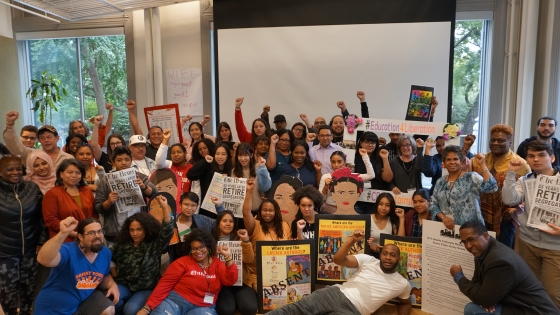Created by the NYC Culturally Responsive Education Working Group, EduColor and the Education Justice Research and Organizing Collaborative (EJ-ROC) at the NYU Metropolitan Center for Research on Equity and the Transformation of Schools
This facilitators guide was a labor of love, authored by Jodi Friedman, Joyce Smith, José Vilson and Huiying B. Chan, with support from Leah Q. Peoples, Matt Gonzales, Megan Hester and the NYC Culturally Responsive Education Working Group. Many thanks and appreciation for all the hours that this team dedicated to creating this resource for educators to move schools toward culturally responsive-sustaining education.
For more information, visit crehub.org
@nyu_ejroc
The NYC Culturally Responsive-Sustaining Education Working Group is composed of educators, researchers, students, policy leaders, community groups and parents collaborating to institutionalize culturally responsive-sustaining education (CRSE) throughout the NYC public school system. The Working Group’s goals are:
-
Support the NYC Department of Education (DOE) to move in the direction of culturally responsive-sustaining practice, in order to improve outcomes and wellbeing for vulnerable student populations;
-
Bring research, practitioner and community expertise to the design and implementation of the DOE’s culturally responsive education strategy;
-
Build a community of allies and validators to build public support, understanding and political will for the expansion of CRSE across NYC schools;
-
Mobilize external stakeholders to secure adoption of CRSE policies and practices that will last across multiple administrations and for generations.
Table of Contents
Introduction
This guide is for those wanting to facilitate and expand the work of CRSE in their schools, classrooms, and beyond.
Preparing to Facilitate
The equity teams we discuss in the following document can be formal school teams, informal lunch and after-school groups of stakeholders, or even practitioners and community members collaborating outside of school hours.
Session 1: Setting the Foundation for Anti-Racist Work and Courageous Conversation
The 4I’s represent any form of oppression: racism, sexism, classism, heterosexism, etc. Our history was founded on oppressive ideology that was then reflected in the foundation of the systems created.
Session 2: Understanding Oppression and Racism
We are going to zoom in specifically on racism throughout these sessions. We know that racism exists across the 4 I’s: ideology, institutional, interpersonal, and gets internalized.
Session 3: Introduction to a Culturally Responsive and Sustaining Education
We will use this session to learn about the specifics of CRSE.
Session 4: CRSE and Me: Personal, Local & Immediate
CRSE requires that we foster and engage in our own learning and awareness about historical as well as contemporary forms of bias and oppression.
Session 5: CRSE & Relationships - Teachers, Staff, & Students
This session includes strategies to develop trust so we can engage in crucial conversations with each other and ensure our environments are welcoming to all.
Session 6: CRSE and Relationships - Families and Communities
CRSE Family and Community Engagement is the practice of authentic, equal partnership with families, rooted in a deep knowledge and appreciation for the rich social and cultural identities, assets and contexts that families bring to learning.
Session 7: CRSE and Curriculum
This session addresses how is rooted in rigor, high culturally responsive teaching expectations and criticality.
Session 8: CRSE and Pedagogy
This session investigates how we can improve classroom and institutional practice through a mindset of high expectations for all students and deep examination and knowledge of one’s personal beliefs.
Session 9: CRSE and Disrupting Systems of Inequity
In this session, we'll do deeper inquiry work around systems of inequity.
Session 10: Closing
In this session, we discuss what an equitable school and/or learning and teaching environment and experience look like.


